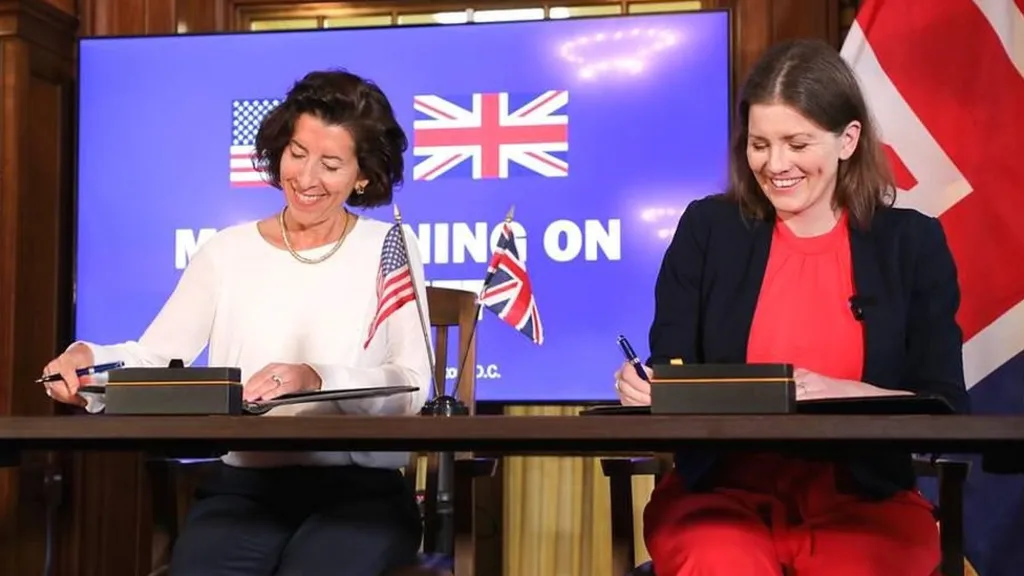In an unprecedented move marking a significant milestone in global technology governance, the United Kingdom and the United States have committed to a collaborative effort aimed at ensuring the safe advancement of artificial intelligence (AI). This partnership, formalized through a memorandum of understanding signed by UK tech minister Michelle Donelan and US Commerce Secretary Gina Raimondo, pledges to develop “robust” methods for the evaluation of AI tools and the systems supporting them. This agreement represents the first of its kind, a bilateral commitment underscoring the critical nature of AI as “the defining technology challenge of our generation,” as stated by Minister Donelan.
A Shared Vision for AI Safety
The essence of this landmark deal is a shared recognition of AI’s potential alongside its risks. The agreement is built on the foundation laid during the AI Safety Summit held in Bletchley Park in November 2023, a gathering that brought together AI luminaries such as OpenAI’s Sam Altman, Google DeepMind’s Demis Hassabis, and tech mogul Elon Musk. This summit led to the creation of AI Safety Institutes in both nations, dedicated to evaluating AI systems, both open and closed-source, to navigate the challenges posed by rapidly advancing AI technologies.
In a world where AI’s capabilities continue to expand, spanning from benign chatbots to potentially autonomous decision-making entities, this UK-US alliance is a beacon of proactive governance. It acknowledges that while the AI sector has been bustling with innovations, regulatory frameworks have lagged, often playing catch-up with the industry’s breakneck pace.
The Regulators’ Tightrope
To date, the burgeoning field of AI, particularly in the realm of generative chatbots like ChatGPT, Gemini, and Claude, has largely been self-regulating. This hands-off approach has so far not impeded the technological strides being made. However, it raises pertinent questions about transparency, particularly concerning the data that trains these AI tools and the environmental footprint of operating such sophisticated systems.
The impending EU AI Act aims to address these concerns, mandating that developers of certain AI systems be transparent about the risks involved and share data-related information. This legislation is seen as a crucial step toward mitigating risks, highlighted by OpenAI’s recent decision to withhold a voice cloning tool due to its potential misuse, especially in sensitive contexts like elections.
The Spectrum of AI and Emerging Threats
The focus of AI safety extends beyond the immediate functionalities of narrow AI, which encompasses systems designed for specific tasks, to the realm of general AI—systems that could potentially perform a broad range of human tasks. The distinction between these two paradigms of AI underscores the broader societal and security implications of unchecked AI development. The potential weaponization of AI technologies calls for a nuanced understanding of their capabilities and vulnerabilities, a task that this new UK-US partnership is poised to undertake.
Professor Sir Nigel Shadbolt of the University of Oxford, while acknowledging the potential dangers, cautions against overhyping the existential risks of AI. Instead, he advocates for a balanced approach that appreciates the efforts to identify and research AI’s potential threats, emphasizing the importance of regulatory measures in fostering beneficial AI advancements.
A Path Forward
This transatlantic agreement signifies more than a bilateral effort; it is a clarion call for international cooperation in the realm of AI safety. By combining resources, expertise, and regulatory frameworks, the UK and US set a precedent for global AI governance. Commerce Secretary Raimondo’s remarks underscore the commitment to not only confront AI-related concerns head-on but also to leverage this partnership to enhance both nations’ understanding and regulation of AI systems.
The implications of this agreement extend across the spectrum of AI risks, addressing national security concerns and societal impacts alike. It’s a holistic approach to ensuring that as AI continues to weave itself into the fabric of daily life, it does so in a manner that is safe, ethical, and aligned with broader societal values.
In the ever-evolving landscape of artificial intelligence, the UK-US partnership stands as a testament to the power of collaboration in the pursuit of innovation tempered with responsibility. As we stand on the cusp of AI’s potential to reshape the world, this landmark agreement serves as both a blueprint and a beacon for the safe stewardship of technology’s next frontier.

